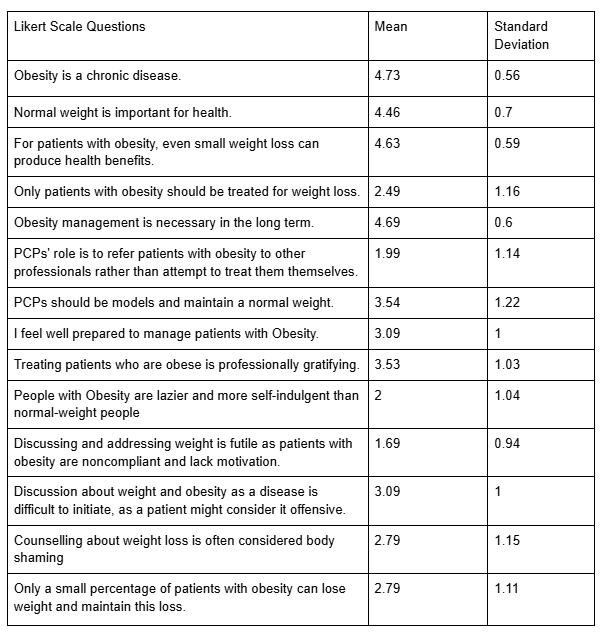Sunday Poster Session
Category: Diet, Nutrition, and Obesity
P0562 - Assessing the Knowledge and Attitudes in Managing Obesity Among Medical Students and Residents at a University Program: A QA/QI Project
Sunday, October 26, 2025
3:30 PM - 7:00 PM PDT
Location: Exhibit Hall

Ritik Goyal, MBBS
Rutgers New Jersey Medical School
Newark, NJ
Presenting Author(s)
Ritik M. Goyal, MBBS1, Kranthi Mandava, MD1, Vraj P. Shah, MD1, Sameer Rao, MBBS1, Yazan Abboud, MD1, Sima Vossough-Teehan, MD2
1Rutgers New Jersey Medical School, Newark, NJ; 2East Orange VA Hospital, East Orange, NJ
Introduction: Obesity is a chronic disease with a rising global prevalence and is linked to diabetes, cardiovascular disease, and liver disorders. Physician bias toward individuals with obesity is well-documented and can adversely affect the patient-provider relationship, compromising the quality of care. In this qualitative study, we aim to assess the knowledge, attitudes, and perceptions related to obesity management among medical students (MS) and residents at a university-based training program.
Methods: We conducted a cross-sectional survey using a validated 20-item anonymous questionnaire to assess knowledge, attitudes, and perceptions toward obesity. The survey included 14 Likert-scale items and 6 multiple-response questions and was distributed to medical students and internal medicine residents at a university-affiliated hospital. Responses were collected via Google Forms and analyzed using SPSS.
Results: A total of 70 responses were recorded, including 16 MS (22.9%) and 54 residents (77.1%). Of all respondents, 27 (38.6%) believed it is solely the physician’s responsibility to counsel patients about obesity, while the rest viewed it as a shared responsibility. Most (82.9%, n = 52) reported that counseling could be improved with more time for patient interaction, and 62.9% (n=42) reported it could be improved if they got advice on how to not offend the patients. Only 21 (30%) routinely discussed the link between obesity and liver disease. When referring to patients, 50 (70.4%) used “patients with obesity,” while 21 (29.6%) used “obese patients.” Most agreed that obesity is a chronic disease (4.7 ± 0.56) requiring long-term management (4.7 ± 0.6), though confidence in managing it was lower (3.1 ± 1). While most disagreed with negative stereotypes (1.69 ± 0.9), many found initiating weight-related discussions challenging due to concerns about offending patients (3.1 ± 1.0).
Discussion: Many trainees feel underprepared to manage obesity despite recognizing it as a chronic disease. Time constraints, discomfort with weight-related discussions, and under-recognition of liver risks hinder care. Focused communication training and a supportive clinical culture that treats obesity as a disease, not a moral failing, can improve trainee confidence and promote respectful, effective conversations.

Figure: Medical Students' and Residents' Knowledge, Attitudes, and Beliefs Regarding Obesity Management Based on Likert Scale Responses

Figure: Medical Students' and Residents' Perspectives and Practices on Obesity Counseling
Disclosures:
Ritik M. Goyal indicated no relevant financial relationships.
Kranthi Mandava indicated no relevant financial relationships.
Vraj Shah indicated no relevant financial relationships.
Sameer Rao indicated no relevant financial relationships.
Yazan Abboud indicated no relevant financial relationships.
Sima Vossough-Teehan indicated no relevant financial relationships.
Ritik M. Goyal, MBBS1, Kranthi Mandava, MD1, Vraj P. Shah, MD1, Sameer Rao, MBBS1, Yazan Abboud, MD1, Sima Vossough-Teehan, MD2. P0562 - Assessing the Knowledge and Attitudes in Managing Obesity Among Medical Students and Residents at a University Program: A QA/QI Project, ACG 2025 Annual Scientific Meeting Abstracts. Phoenix, AZ: American College of Gastroenterology.
1Rutgers New Jersey Medical School, Newark, NJ; 2East Orange VA Hospital, East Orange, NJ
Introduction: Obesity is a chronic disease with a rising global prevalence and is linked to diabetes, cardiovascular disease, and liver disorders. Physician bias toward individuals with obesity is well-documented and can adversely affect the patient-provider relationship, compromising the quality of care. In this qualitative study, we aim to assess the knowledge, attitudes, and perceptions related to obesity management among medical students (MS) and residents at a university-based training program.
Methods: We conducted a cross-sectional survey using a validated 20-item anonymous questionnaire to assess knowledge, attitudes, and perceptions toward obesity. The survey included 14 Likert-scale items and 6 multiple-response questions and was distributed to medical students and internal medicine residents at a university-affiliated hospital. Responses were collected via Google Forms and analyzed using SPSS.
Results: A total of 70 responses were recorded, including 16 MS (22.9%) and 54 residents (77.1%). Of all respondents, 27 (38.6%) believed it is solely the physician’s responsibility to counsel patients about obesity, while the rest viewed it as a shared responsibility. Most (82.9%, n = 52) reported that counseling could be improved with more time for patient interaction, and 62.9% (n=42) reported it could be improved if they got advice on how to not offend the patients. Only 21 (30%) routinely discussed the link between obesity and liver disease. When referring to patients, 50 (70.4%) used “patients with obesity,” while 21 (29.6%) used “obese patients.” Most agreed that obesity is a chronic disease (4.7 ± 0.56) requiring long-term management (4.7 ± 0.6), though confidence in managing it was lower (3.1 ± 1). While most disagreed with negative stereotypes (1.69 ± 0.9), many found initiating weight-related discussions challenging due to concerns about offending patients (3.1 ± 1.0).
Discussion: Many trainees feel underprepared to manage obesity despite recognizing it as a chronic disease. Time constraints, discomfort with weight-related discussions, and under-recognition of liver risks hinder care. Focused communication training and a supportive clinical culture that treats obesity as a disease, not a moral failing, can improve trainee confidence and promote respectful, effective conversations.

Figure: Medical Students' and Residents' Knowledge, Attitudes, and Beliefs Regarding Obesity Management Based on Likert Scale Responses

Figure: Medical Students' and Residents' Perspectives and Practices on Obesity Counseling
Disclosures:
Ritik M. Goyal indicated no relevant financial relationships.
Kranthi Mandava indicated no relevant financial relationships.
Vraj Shah indicated no relevant financial relationships.
Sameer Rao indicated no relevant financial relationships.
Yazan Abboud indicated no relevant financial relationships.
Sima Vossough-Teehan indicated no relevant financial relationships.
Ritik M. Goyal, MBBS1, Kranthi Mandava, MD1, Vraj P. Shah, MD1, Sameer Rao, MBBS1, Yazan Abboud, MD1, Sima Vossough-Teehan, MD2. P0562 - Assessing the Knowledge and Attitudes in Managing Obesity Among Medical Students and Residents at a University Program: A QA/QI Project, ACG 2025 Annual Scientific Meeting Abstracts. Phoenix, AZ: American College of Gastroenterology.

